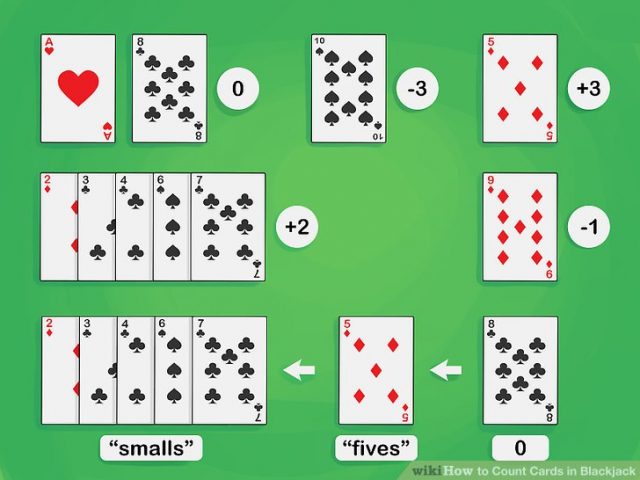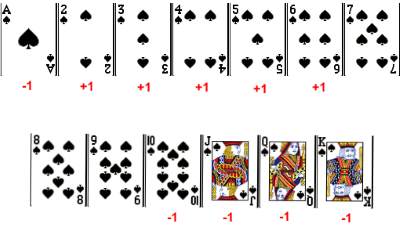How To Count Cards In Blackjack Hi Lo System
I begin with the OPP card counting system since it’s extremely easy to use. Hi-Lo Count: This is a balanced count and is the first system that new counters use. You add one to the total for each card value from two through six — and subtract one for 10s through aces. Seven, eight and nine are neutral. You then divide this count by the number of undealt decks and round up as needed. To count with the High Low card counting, you begin with zero and then count every card as per the following: Card worth 2, 3, 4, 5, 6 are +1. The 7, 8, nine are 0 and the 10; Ace are -1. The low cards from 2 to 6 are counted as positive. The Hi Lo System was Ed’s second count system and Blackjack players instantly took a liking to it because the +4’s and -9’s of the 10 Count were replaced by -1’s and +1’s. The increased accuracy and reliability of the Hi Lo System made it one of the premier card counting strategies for many years, and it is still used today by some. To account for this fact, the Hi-Lo system assigns the following count values to the cards: Aces, 10s, Queens, Kings, and Jacks are counted as -1 because they favor the player Small cards 2, 3, 4, 5, and 6 are counted as +1 because they favor the house The 7s, 8s, and 9s are considered neutral cards and have a.
If you’re interested in blackjack card counting, then you’ll have many systems to choose from. Each system varies based on its degree of accuracy and complexity.
Despite the variety, though, most gambling experts quickly recommend the Hi-Lo system. Blackjack legends such as Al Francesco, James Grosjean, and Tommy Hyland have used this counting strategy to make fortunes.
Nevertheless, some card-counting methods can deliver an even bigger edge over the casino. Why, though, is everybody so quick to push the Hi-Lo system?
The following guide discusses how this counting system works, its advantages, and why it’s so popular among both experts and amateurs.
How To Count Cards Hi Lo Method
How Does the Hi-Lo System Work?
The Hi-Lo is one of the easiest counting systems to use. Herein lies one of the biggest reasons why it’s so recommended.
This system can be used in a few simple steps. Here’s a short guide on how to successfully employ the Hi-Lo.
1 – Assign Values to Each Card
This counting strategy requires you to break cards down into different groups and assign them point values as follow:
- Low cards (2 through 6) = +1
- Non-counting cards (7, 8, and 9) = 0
- High cards (10 through A) = -1
You need to watch for and count every card that comes out of the shoe, regardless of whether it’s meant for you, the next player, or the dealer. Failure to account for even one card can throw the count off and lower your potential edge.
2 – Convert to the True Count
Most blackjack games today involve multiple decks. With that being said, you have to account for all available decks when playing shoe games.
The “true count” takes multiple decks into consideration. You arrive at the true count by multiplying the running accurate count by the estimated number of remaining card decks.
Here’s a quick example on doing so:
- The running card count is +8.
- You make an estimate of four decks remain.
- 8 / 4 = +2 is the true card count

3 – Raise Bets When Necessary
The final step to using the Hi-Lo involves raising bets during positive counts. To do this, you must first set a unit size that measures how much to increase wagers.
Here’s a look at how you can do this:
- The table’s minimum bet is $10.
- You place the smallest bet you can until the true count becomes positive.
- You set a unit size of $25.
- You’ll add one unit for every +1 on the true count.
- +1 true count = $25 bet
- +2 true count = $50 bet
- +3 true count = $75 bet
- +4 true count = $100 bet
You must be careful when setting your unit size. A larger unit and, thus, bigger raises often alert a casino employee or pit boss and get you thrown out (covered more later).
The key is to consider your “bet spread.” The latter is the distance between a table’s minimum wager and your maximum bet during positive counts.
You generally want the spread to be between 1-10 (e.g. $10 to $100) and 1-15 ($10 to $150). Some casinos may be stricter or more lenient on these spreads, but 1-15 is often the highest you can realistically go.
What Are the Advantages of the Hi-Lo?
The Hi-Lo enjoys favorable status among many counters for multiple reasons. Here are the biggest reasons why you should consider this system.
Solid Edge Over the Casino
This system isn’t the most accurate among different counting strategies. However, it’s good enough to create a decent edge over the house.
Provided you rarely make mistakes, you’ll be looking at between a 1% and 1.5% advantage with the Hi-Lo. This edge is about the same that casinos enjoy over knowledgeable amateur players.
You may not see the fruits of this advantage immediately. If you keep playing, though, then you’ll eventually rack up serious profits.
Easy to Learn
Contrary to popular opinion, you don’t need to be a genius to master card counting. Instead, you can learn the Hi-Lo with relative ease.
As shown in a previous section, this system only involves three main aspects:
- Keeping a running count.
- Converting to a true count.
- Raising at the right times.
You may not find this system totally easy to implement in the beginning. However, you at least won’t struggle to learn it.

Works on Multi-Deck Games
The majority of blackjack games today feature multiple decks. Casinos began implementing shoe games in the late 1960s as a way of thwarting card counters.

Luckily, gambling experts found a way around this by developing unique systems. The Hi-Lo is one such strategy that allows you to get around the multi-deck shoe problem.
You need only convert your running count to a true count. This step should be no problem as long as you’re good at estimating how many decks are left in the shoe.
Do More Accurate Card Counting Systems Exist?
The Hi-Lo may be the most popular card counting system, but it’s not the most accurate. Mathematicians have developed more powerful systems through computer programs.
The Thorp Ultimate, for example, can provide a bigger edge over the house. It differs greatly from the Hi-Lo when assigning values to different cards.
Here’s a look at the values for each card:
- 2 = +5
- 3 = +6
- 4 = +8
- 5= +11
- 6 = +6
- 7 = +4
- 8 = 0
- 9 = -3
- 10-K = -7
- A = -9
This setup is like night and day compared to the Hi-Lo. Rather than just adding a simple -1 or +1 here or there, you assign everything from -9 to +11 to cards.
Probably not, unless you’re a computer, which is why systems like the Thorp Ultimate are suspended in theory rather than practicality.
The Goal Is to Minimize Mistakes
You’ll enjoy more card-counting winnings by being accurate with a simple system rather than being less accurate with a complicated strategy.
As explained above, some computer-developed systems are more accurate than the Hi-Lo. But they’re simply not feasible when playing in a real game.
The main two goals with card counting include:
- Using a legitimate system
- Minimizing mistakes
The latter is sometimes overlooked by aspiring card counters. They think that profits are guaranteed so long as they’re using a system no matter how skilled or bad they may be.
However, avoiding mistakes is extremely important to booking profits. It’s also far more crucial than merely using the most accurate system.
The Hi-Lo works well enough to guarantee winnings. Its simplicity also reduces the chances that you’ll make mistakes when counting.
Of course, you should practice quite a bit before counting in casinos. Practice helps you avoid mistakes during a live game.
Here are some different ways to practice your counting abilities:

- Deal cards to yourself.
- Have a friend deal cards while acting as the dealer.
- Use an online training program.
- Visit a land-based casino and count off to the side.
- Play low-stakes blackjack and practice counting without raising bets.
How to Avoid Getting Caught While Using the Hi-Lo
Learning and mastering the Hi-Lo are big parts of being successful with card counting. However, you need to take things further by also camouflaging your play.
Pit bosses are tasked with rooting out card counters because casinos don’t like losing fortunes to advantage players. Therefore, you must be good enough to keep an accurate count without being too obvious about the matter.
The first step to accomplishing this goal involves blending in with other players. You can do so by looking like the average gambler and acting casual.
Of course, you’ll need to raise your bets at some point when the count is positive. Bet spreading is often a giveaway to card counting.
You should research casinos and find out which ones are more lenient on bet spreading. Some casinos will let you go for a while before the pit boss begins monitoring you, while others clamp down right away.
Conclusion
When it comes to blackjack card counting, simpler is better. The key is accuracy rather than using a highly complicated system that increases the likelihood of mistakes.
Some computer-developed strategies, like the Thorp Ultimate, are more accurate. Your chances of pulling off such systems, though, are 0%.
For this reason, the Hi-Lo system reigns supreme. It provides enough accuracy and, most importantly, simplicity.
You can quickly learn and implement the Hi-Lo. As a result, you’ll be able to dedicate more time to working on camouflaging your play.